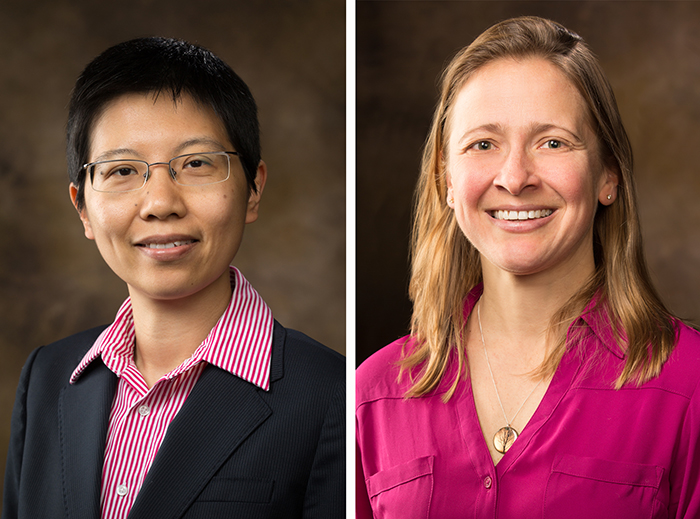
Ammonia is the world's primary raw material for nitrogen-based fertilizer production, but producing it consumes a large amount of energy—1- to 2-percent of energy consumption worldwide. The National Science Foundation has awarded $450,000 to Jingyi Chen and Lauren Greenlee to develop alternative processes for producing ammonia. The research will also lead to a more refined and environmentally softer method of producing hydrogen for energy storage and fuel and chemical production.
Chen is an associate professor of chemistry and biochemistry in the J. William Fulbright College of Arts and Sciences, and Greenlee is an assistant professor of chemical engineering in the College of Engineering. Their work supports the NSF's goal of discovering and developing sustainable energy sources.
Conventional processes for ammonia production, primarily the Haber-Bosch thermal catalytic method, rely on hydrocarbon resources for the hydrogen needed to produce ammonia. Chen and Greenlee are developing catalytic electrochemical processes, or "electrolyzers," for an alternative method of producing ammonia and hydrogen. Specifically, they focus on a method called nitrogen reduction reaction, in which nitrogen is combined with water molecules to form ammonia. They are also studying oxygen evolution reaction, during which water splits to oxygen and hydrogen. For both methods, the researchers are seeking efficient, nonprecious-metal nanocatalysts that can operate at ambient temperature rather than the high-temperature conditions required for hydrocarbon-based technologies.
The researchers will characterize iron and nickel nanostructures as bimetal catalysts and evaluate the reactivity and selectivity of these catalysts for both electrochemical processes. They will then use x-ray absorption spectroscopy to develop methods to correlate the structure and composition of the metals with electrocatalytic activity.
The goal of the project is to design a low-cost and better performing catalytic electrolyzer that can be developed for commercial production.
By integrating research and education, the project is designed to increase student participation in the fields of science, technology, engineering and math (STEM). Chen and Greenlee will recruit students from under-represented groups to participate in the research program. The researchers' findings will be integrated into teaching and curriculum development for the departments of Chemical Engineering and Chemistry and Biochemistry.
Topics
Contacts
Jingyi Chen, associate professor
Department of Chemistry and Biochemistry
479-575-6203, chenj@uark.edu
Lauren Greenlee, assistant professor
Ralph E. Martin Department of Chemical Engineering
479-575-5976, greenlee@uark.edu
Matt McGowan, science and research communications officer
University Relations
479-575-4246,
dmcgowa@uark.edu